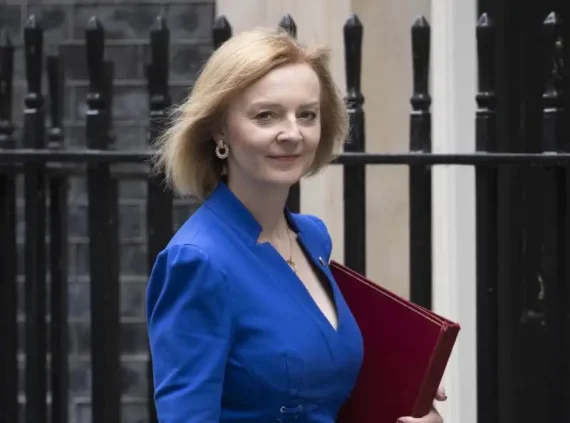Liz Truss is the Member of Parliament for Southwest Norfolk, Secretary of State for Foreign, Commonwealth, and Development Affairs, and Minister of Women and Equalities. She is presently one of the leading candidates for the leadership of the Conservative Party, who will likely become the next British Prime Minister.
The alternatives for Boris Johnson’s replacement as party leader and Prime Minister have been reduced to two contenders by Conservative MPs. On September 5, following a runoff vote among Conservative party members, either Foreign Secretary Liz Truss or former Chancellor Rishi Sunak will be crowned the victor.
With three weeks remaining in the contest for the leadership of the British Conservative Party, the foreign secretary is farther ahead of her opponent Rishi Sunak. She has the support of eleven government whips as she strives to extend her advantage against Rishi Sunak among Conservative party members.
In light of the increasing cost of living and the impending recession, the new British prime minister will have to strike the ground running. Therefore, the focus has already shifted to Truss’ first steps at No. 10 should she become Prime Minister as predicted.
According to YouGov, Liz Truss now has a 38-point advantage against Rishi Sunak among Conservative members. Currently, the foreign secretary has 69% of the popular vote versus Sunak’s 31%. Both contenders have set out some of their policies already and will continue to do so in the coming weeks – Here is what we know about Liz Truss so far.
Domestic Affairs
Speaking at the Tory party leadership debate in Eastbourne, Truss said that if she were to become prime minister, her proposals for quick tax cuts may prevent a recession.
She stated: “I know there are difficult forecasts out there, but forecasts are not destiny. And what we shouldn’t be doing is talking ourselves into a recession. We should be keeping taxes low.”
This is in response to the Bank of England’s warning that a recession will hit the UK as interest rates are increased by the greatest in 27 years.
According to the Bank of England’s Governor, Andrew Bailey, “what has happened is there has been a series of big supply side shocks, most of which were outside… I would dare anyone to have been in this position two years ago and predicted a conflict in Ukraine,” he continued. He maintained that, while the bulk of inflationary pressure was caused by rising gas prices in the aftermath of Russia’s invasion of Ukraine, boosting interest rates was required to avoid excessive inflation from being ingrained.
Immigration
Truss has nearly always voted for stricter asylum laws and has consistently supported stricter enforcement of immigration laws. She has stated that she “completely agrees” with the Rwandan government’s immigration policy and has gone further than other candidates, reportedly planning to “extend the controversial policy to other countries” if elected prime minister.
She stated, “As prime minister, I am determined to see the Rwanda policy through to full implementation as well as exploring other countries where we can work on similar partnerships.”
She was absent in 2020 from a vote on the Immigration and Social Security Coordination (EU Withdrawal) Bill — New Clause — Leave to Enter: Family Unity and Asylum Claims. She has also voted to remove the ability of unaccompanied asylum-seeking children, spouses, vulnerable adults, and dependent adults to join a legally present family member in the United Kingdom.
Education
Truss has virtually always voted in favor of turning primary and secondary schools into academies, and she has repeatedly voted to withdraw financial aid for certain 16- to 19-year-olds in training and higher education. In addition, she voted to increase university tuition fees to £9,000 per year.
Recommended
Foreign Policy
Truss voted a mixture of for and against strengthening the Military Covenant. Truss has regularly supported the employment of British military personnel in combat operations abroad during her time as a member of parliament, including voting for military action against Daesh in Syria. But she also voted against Iraq War inquiry bills.
In November 2016, Truss voted against an investigation into the disparity between public rhetoric and private conduct before the Iraq war. In November, 2020, she voted in favor of putting limitations on the prosecution of members of the armed forces for their conduct while deployed abroad, including in cases of alleged torture, therefore reiterating her earlier vote.
However, in an interview with the BBC, she said that if she were to become prime minister, she would not deploy British soldiers into Ukraine.
She stated, “We are doing all we can to support Ukraine. We’ve led the international coalition on sending weapons, we’re putting the sanctions in place, but I do not support the direct involvement of UK troops.”
What happens next?
The two candidates must now face off in 5 Tory hustings debates throughout the nation, a procedure that started on July 28 in Leeds and will culminate on August 31 in London. The victor will be declared on Monday, September 5, and will become the next Conservative Party leader and Prime Minister.





